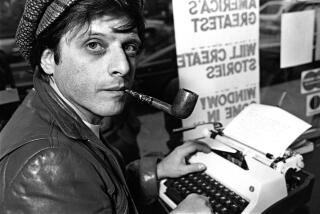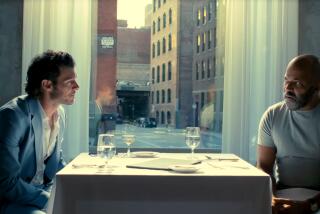One-Off
- Share via
Until 1968, Frederick Exley was known to friends and family only as an irresponsible drifter, drunk and freeloader who had spent most of his time in mental institutions or on other people’s couches but rarely gainfully employed. His reputation changed and grew dramatically that year when he did what those who knew him thought was impossible for him: He became an author. At 39, Exley published “A Fan’s Notes,” a “fictional memoir” of his years after college at USC when he drifted around the country obsessed with a desire for fame and projecting that desire and its attendant resentments onto then-football star Frank Gifford.
Exley’s book received strong reviews from a variety of prominent book critics and authors--Christopher Lehmann-Haupt, Rudolph Wurlitzer and Robert Penn Warren--and it was compared to “The Great Gatsby,” particularly for its exploration of class anxieties. Exley was a middle-class white boy from Watertown, N.Y., thumbing his nose at the masquerade of American success and respectability and doing so with an ironic eloquence reminiscent of Vladimir Nabokov.
Jonathan Yardley’s “Misfit: The Strange Life of Frederick Exley” attempts to explain where Exley came from, how he suddenly became a noted American author and, most important, why he failed to produce another book as worthy as “A Fan’s Notes.” Yardley demonstrates how most of the “long malaise” represented in the novel can be found in Exley’s life and that Exley only changed the names and made some composites to protect the innocent and, in some instances, himself.
Yardley believes that Exley’s personal narrative transcends itself by intersecting with some important American mythologies: the predicament of the American middle-class white male and the story of the defiant nonconformist individual finding his own way in the American wilderness: “The Fred Exley of ‘A Fan’s Notes’ is one of the great characters of American literature, Huck Finn gone alcoholic and dissipated but still lighting out for the territory, putting as much distance as possible between himself and civilization. Raucous and obscene, demented and obsessed, wounded and vulnerable--there is something within him that touches and surprises every reader.” For Yardley, the great mystery and surprise is that such a lout managed to pull from the wreckage of his life a beautiful book.
The case for the beauty of Exley’s book depends on how much self-obsession and confession the reader can stand. “A Fan’s Notes” is an elaborate confession of Exley’s egotism and irresponsibility. But confession has built into it the irony of making a case for one’s failings even while appearing to be ashamed of them. Yardley claims that Exley “wanted to be unusual, sui generis, but he wanted to be ordinary too.” This is a succinct statement of the American pastoral ideal: how to be an emperor while still acknowledging the reality of others and the pleasures and comforts of democracy. But when reading Exley, or Yardley’s account of him, one has doubts whether he really ever wanted to be ordinary or whether he cared about anything but himself.
An epiphanic pastoral moment in “A Fan’s Notes” finds Exley enjoying a Giants’ game with a group of working-class fans: “We were Wops and Polacks and Irishmen out of Flatbush, along with one mad dreamer out of the cold, cow country up yonder, and though we may not have had the background, or the education, to weep at Prince Hamlet’s death, we had all tried enough times to pass and kick a ball, we had on our separate rock-strewn sandlots taken enough lumps and bruises, to know that we were viewing something truly fine, something that only comes with years of toil, something very like art.” It is notable how Exley’s epithet for himself (“one mad dreamer”) is so very romantic compared with those he uses for the people around him. Nor can he resist reminding us of his literary knowledge when it could hardly have been an issue for those spectators he claims fraternity with.
Yardley speculates that as a result of Exley’s inability to be ordinary, his “heartache must have been torture, and his loneliness must have been unbearable.” Passages such as this and Yardley’s account of Exley’s life suggest the only thing unbearable about Exley was his transparent egotism, his true contempt and condescension toward everything but himself. He possessed an ability to turn every situation and person into a charming little portrait in his own gallery of sentiment and inebriated nostalgia.
Yardley is on target when he asserts that the autobiographical novel is inherently limited when the author cannot transcend himself: “Because fiction arises from the writer’s individual imagination, it cannot help being autobiographical in some intrinsic way, but that is not all it has to be.” This is a valid criticism of Exley and goes to the heart of his ultimate failure to produce anything worthy of serious consideration after that one book. It may also account for what is wrong with “A Fan’s Notes.” A Huck Finn or Holden Caulfield who does not grow up becomes tiresome fast and, as Yardley shows us, this is the kind of pathetic creature Exley was and remained. Though he wrote two other books, “Pages From a Cold Island” and “Last Notes From Home,” they drowned in the bottle (Yardley is right in pointing out how Exley’s alcoholism became an unfortunate way of literary life) of the author’s self-obsession.
Yardley attempts to account for Exley’s great ability and his failure, his great “rage” born of some mysterious “wound.” He leads us through Exley’s unresolved relationship with his father, a pipe fitter and local sports hero who humiliated his teenage son with displays of his athletic prowess and who also read and wrote poetry. We learn of a failed high school crush and of a car accident that produced a permanent, though not particularly debilitating, injury to his right arm that ended his high school football career. None of these facts really add insight into Exley’s life, and Yardley drifts unfortunately into speculation about “repressed sexual identity” and the possibility that Exley “denied or doubted his essential nature.” Yardley’s analysis of Exley’s pain becomes little more than a cliche of the appropriation of cheap psychology in contemporary literary biography.
Yardley never really explains how Exley’s life as a misfit and his desire to lead a life of the mind (even if it is only his own mind) tell us something about what it means to be a middle-class white male. Nor can Yardley quite account for the miracle of how this drunken lout managed to discipline himself sufficiently to get “A Fan’s Notes” written. Aside from noting that Exley read a great deal as a student at USC, Yardley has little information about how Exley’s thoughts developed. An enigmatic, introverted man, Exley died in 1992 at 63 and left few original sources necessary to write a complete life. Yardley is left a bit like Melville’s lawyer contemplating the unfortunate but remarkable life of the taciturn Bartleby.
But Exley was not a silent copyist like Bartleby, and he produced a book that continues to fascinate people. Yardley makes a grand claim for its merit as one of the great American books of the 20th century, equal to “the best work of Ralph Ellison, Eudora Welty, Peter Taylor, Bernard Malamud, Saul Bellow, Flannery O’Connor, John Cheever--all the other writers of the best books of our age.” This kind of swirling punditry is useless criticism, an overwrought blurb at best.
Yardley pushes his case by reminding us that we should not belittle Exley’s achievement because he wrote only one good book, and he makes the analogy to Ellison’s enduring accomplishment, “Invisible Man.” At this point, Yardley’s judgment moves from poor to execrable. The struggle of a black man for identity in 20th century America is far more worthy--and less boring--subject matter than the resentment of a vain and self-obsessed would-be novelist. Ellison’s style becomes something that enables us to see others and not only the dark glass of his own ability. Yardley’s biography of Frederick Exley is likely to be of interest to die-hard Exley fans, but it won’t make converts.
More to Read
Sign up for our Book Club newsletter
Get the latest news, events and more from the Los Angeles Times Book Club, and help us get L.A. reading and talking.
You may occasionally receive promotional content from the Los Angeles Times.










